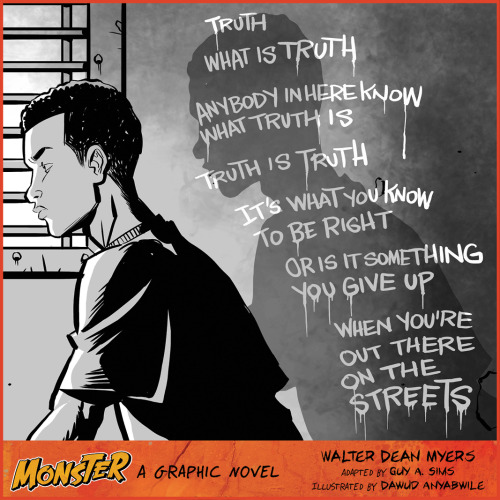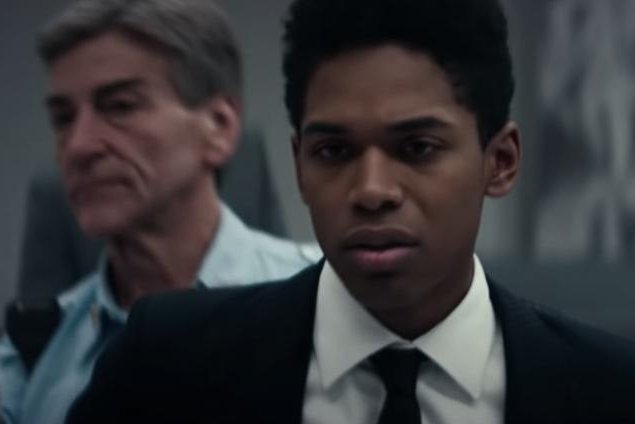Monster
Monster by Walter Dean Myers is a hard book to read. I felt confused, upset, sickened, and disconnected on many different levels, but perhaps that was Myers goal when he was writing the book, to keep the reader feeling as confused and off kilter as young Steve does as he faces his incarceration and trail. Myers uses multiple modes of narration and points of view to share the story.
Switching between forms, employing elements from both screenplays and memoirs as the story progresses, Myers keeps readers continually re-evaluating what they are reading and how they feel about the events. This technique allows the reader to understand that Steve is human, with feelings and capable of self-reflection and hopefully growth, while also experiencing the powerlessness Steve feels as the reader views the events through the lens of a screenplay. These changes in form both distract the reader and help to create layers of texture to the story, ultimately engaging the reader on many different levels.
Sixteen-year-old Steve finds himself in an unimaginable predicament; he is being held, as an adult, in the Manhattan Detention Center awaiting trial for murder. He is young, somewhat naive, but knows he must do whatever is needed to survive - the trial and his time incarcerated. Steve shares the surrealness of his current situation in the first chapter, presented as a diary entry, setting the scene for how the story will unfold:
Sometimes I feel like I have walked into the middle of a movie. It’s a strange movie with no plot and no beginning. The movie is in black and white, and grainy. Sometimes the camera moves so close that you can’t tell what is going on a and you just listen to the sounds and guess. I have seen movies of prisons but never one like this. This is not a movie about being behind bars and locked doors. It is about being alone when you are not really alone and about being scared all of the time. (3-4).
Steve decides that he must give up what he thinks is real. In his mind retelling the story of his incarceration and trail as a movie, is one way he can cope and survive. Immediately the reader is thrust into the middle of a screen play where Steve remains detached from the events of the trail, while also retelling the story, and allowing the reader to experience other points of view.
Steve is lost at the detention center, nothing seems real, he feels a a great deal of fear and apprehension being detained, and very little control in his life, so he decides to create his own realty by writing a movie, which he calls Monster because “I’ll call it what the lady who is the prosecutor called me” ( 5). Steve is searching for his identity, trying to find what is real, whilst being set up by the prosecutor . The reader sees that there is little truth in the justice system. Steve is a young, black, male, from the wrong neighborhood – he is guilty in the eyes of the jury and prosecutor, and the onus is on him to prove his innocence, his attorney explains this to him:
O’BRIEN
Well, frankly, nothing is happening that speaks to your being innocent. Half of those jurors, no matter what they said when we questioned them when we picked the jury, believed you were guilty the moment they laid eyes on you. You’re young, you’re Black, and you’re on trial. What else do they need to know?
STEVE
I thought you’re supposed to be innocent until you’re proven guilty?
O’BRIEN
That’s true, but in reality it depends on how the jury sees the case. If they see it as a contest between the defense and the prosecution as to who’s lying, they’ll vote for the prosecution. The prosecutor walks around looking very important. No one is accusing her of being a bad person. They’re accusing you of being a monster. The jury can ask itself, Why should the prosecutor lie? Our job is to show that she’s not lying, but she’s simply made a mistake. How are you feeling? Is your stomach still upset? (78-79)


Comments
Post a Comment